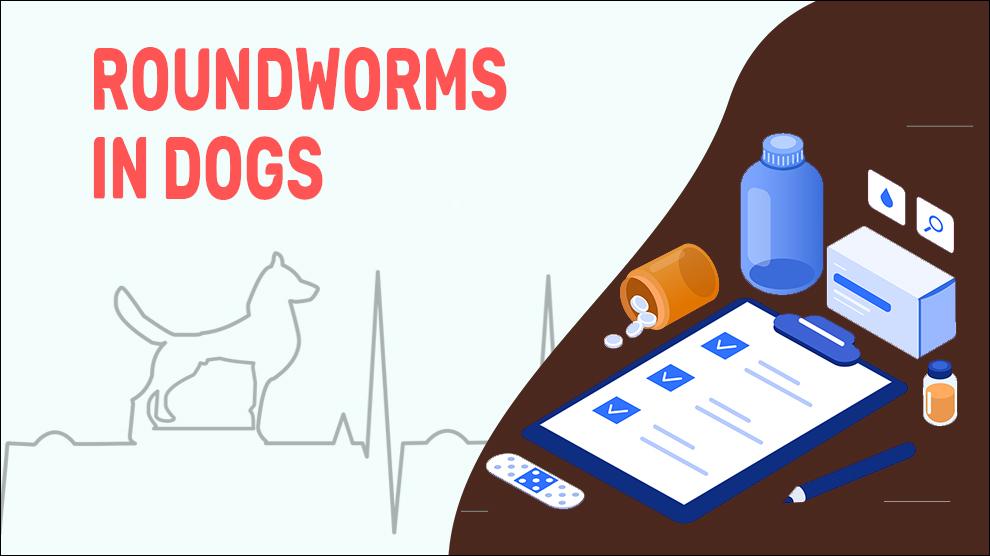What Is Roundworms In Dogs?
Intestinal parasites are a great problem for dogs specifically for young pups. Intestinal parasites are only occasionally fatal for adult dogs. Immunocompromised dogs or debilitated animals are more likely to experience harsh intestinal parasitism and manifest clinical signs.
The most common intestinal parasites are roundworms. Roundworms belong to nematodes or ascarids that live freely in the dog’s intestine. Roundworms are white/ pinkish, spaghetti-like, or round-bodied worms and adult worms can get up be of 7cm to 18cm long. Toxocara Canis Toxascaris leonine are the 2 most common roundworms that inhabit dogs’ intestines. Definitely, T Canis is the most prevalent parasitic roundworm in dogs. Almost all puppies get infected and approximately 25% of dogs less than 6 months of age actively shed these eggs. For most of their life, these worms are within the gut of dogs, feeding on partially digested intestinal contents.
After worm copulation within the intestine, roundworms reproduce by laying eggs. These unembryonated eggs are passed out to the external environment through feces. A single adult roundworm can release more than 85 000 eggs/day. The prepatent period is up to ten weeks and then becomes contagious. in the environment, The eggs will be embryonated developing into first-stage larvae and when these eggs are ingested by paratenic or transport hosts, second-stage larvae develops. When these paratenic hosts are eaten by dogs, the larva reaches the dog’s intestine.
Importantly, if a puppy <3 months of age ingests larval eggs, they can migrate through the trachea. If the host dog is > 3 months of age, migration will be somatic, including multiple organs such as the lungs, liver gut wall, and skeletal muscles. Female dogs can transmit infections to their puppies via the milk or placenta. This is the most common route of infection for puppies. The sad news is Toxocara can also infect humans. Although it is usually not dangerous in adults, it may cause serious damage to kids’ vision.
Symptoms Of Roundworms In Dogs
Treatment Options For Roundworms In Dogs
Deworming medication (anthelmintic) will be recommended by your veterinarian based on the extent of infestation together with the proper administration protocol.
Stool (fecal) examinations should be conducted 3 to 5 times during the first year of life and after that, yearly once or twice is more than enough.
Oral deworming drugs: Piperazine, Pyrantel, Fenbendazole, Moxidectin, and Milbemycin.
Home Remedies For Roundworms In Dogs
Roundworm infections are never going to go away on their own. While roundworms are treatable, however, keep in mind that the best way to protect your pets against parasites is to use parasite preventatives.
How To Prevent Roundworms In Dogs?
- Initial treatments should be given to all puppies (> 3 weeks of age).
- It is good to perform fecal tests yearly for adult dogs.
- Follow dog worms preventive medication monthly.
- Try the annual dewormer protocol for dogs as recommended by your vet.
- In your home, maintain good sanitary and hygienic conditions; periodically clean up your backyard. This includes restricting indoor exposure to fecal matter, contaminated soil, and/or host animals.
- Whatever may be the lineage or age, upon acquisition of new dogs makes sure to follow a dewormer immediately or follow your veterinarian's directions.
Affected Dog Breeds Of Roundworms
There is no breed predisposition. Puppies are overrepresented.
Causes And Types For Roundworms In Dogs
1. Causes:
- An adult dog gets parasites through eggs in contaminated food, feces, soil, or water.
- Eating or smelling feces from an infected animal or eating an infected small rodent.
- Puppies usually get roundworms from their mother through the placenta and during nursing.
2. Types:
- Roundworms (ascarids)
- Puppies: Toxocara Canis
- Older dogs: Toxascaris leonina
3. Mortality:
Roundworms are fatal for young pups whereas it is rarely serious in adult dogs, that too in weak, debilitated, or immunosuppressed animals.
4. Diagnosis:
- A complete blood count (CBC), chemistry profile
- Urinalysis
- Fecal flotation
5. Prognosis:
Dog's with a mild infestation, a quick recovery can be assured, once treatments have begun. When there is a chronic infestation, it may take a longer time for your dog to recover.
Properly adhere to the veterinarian's treatment protocol and provide medications as recommended. The medications are usually repeated in 3-4 weeks to break the life cycle so that dogs don't just get it again from the same source.
When To See A Vet For Roundworms In Dogs?
Contact your vet right away, if you notice any of the following:
- Abdomen distension
- Diarrhea, with or without blood or mucus
- Adult worms in stool
Food Suggestions For Roundworms In Dogs
- Offer bland meals for 1 or 2 days
- Whole, unprocessed foods or Nutrient-dense and biologically suitable foods
- 2 part cooked rice + 1 part boiled lean hamburger
- 2 parts rice or cooked macaroni + One-part boiled egg or cottage cheese
- Pumpkin seeds, carrots, Bananas, Apples, Seaweed
- Probiotics (yogurt, kimchi, kefir with live cultures, fermented vegetables)
Conclusion
Roundworms are infectious to humans and other animals. Roundworms pose a significant risk to humans but they are not directly transmitted to humans as they need an intermediary host, like a flea, or from direct contact with the contaminated soil or feces from infected animals. Washing your hands regularly is the best preventive action to avoid round worm infection.

















